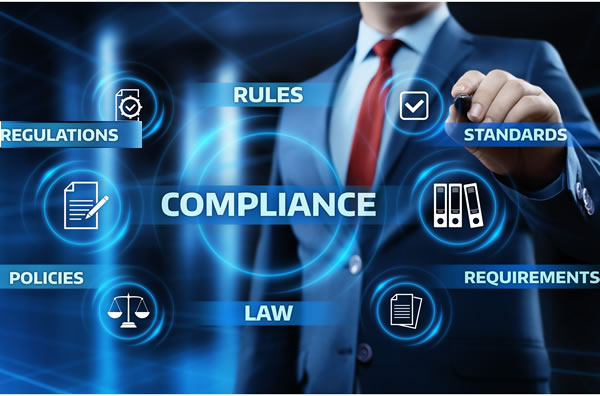
Protecting Personal Data: Compliance With Data Privacy Regulations
What Is Personal Data?
Personal data refers to any information that relates to a recognized or identifiable individual. It encompasses a broad range of data, including but not bound to names, addresses, phone numbers, email addresses, financial details, photographs, biometric information, social media posts, and IP addresses.
Personal data can be collected directly from individuals or obtained from other sources. It is protected by various data protection laws and regulations globally, which aim to ensure the privacy, security, and responsible handling of this sensitive information. Safeguarding personal data is essential to respect individuals’ privacy rights and maintain trust in the digital age.
Causes Of Protection Of Data:
With the increasing reliance on digital technologies, protecting data has become a critical concern. This article examines the key causes driving the need for data protection and the importance of safeguarding sensitive information.
Privacy and Confidentiality:
Preserving privacy and maintaining confidentiality are primary reasons for data protection. Individuals and organizations have a right to keep their personal or sensitive information private, preventing unauthorized access and misuse.
Preventing Unauthorized Access:
The protection of data is crucial to prevent unauthorized access to sensitive information. This includes guarding against cyberattacks, hacking, and unauthorized disclosure, ensuring that data remains secure and accessible only to authorized individuals.
Compliance with Regulations:
Data protection is necessary to comply with various regulations and laws, such as the (GDPR) and (CCPA). Compliance ensures that organizations meet legal requirements for handling and protecting personal data.
Mitigating Data Breaches:
Data breaches pose significant risks, including financial losses, reputational damage, and legal consequences. Protecting data helps mitigate these risks by implementing security compute such as encryption, access controls, and vulnerability assessments.
Preventing Identity Theft:
Data protection plays a critical role in preventing identity theft. Safeguarding personal information, such as social security numbers, financial details, and biometric data, reduces the risk of identity theft and fraud, protecting individuals’ financial well-being and reputation.
Preserving Intellectual Property:
Data protection is vital for preserving intellectual property rights. Companies invest significant resources in research, development, and innovation. Protecting their data safeguards trade secrets, proprietary information, and competitive advantages.
Building Trust and Reputation:
Data protection fosters trust and enhances an organization’s reputation. When individuals and customers trust that their data is handled securely and responsibly, they are more likely to engage with the organization and maintain a positive perception of its brand.
Data Retention and Lifecycle Management:
Data protection involves establishing policies for data retention and lifecycle management. Properly managing data throughout its lifecycle ensures that it is stored, accessed, and eventually disposed of securely, minimizing risks associated with outdated or unnecessary data.
Ensuring Business Continuity:
Data protection is essential for ensuring business continuity. By implementing backup and disaster recovery measures, organizations can recover data in the event of system failures, natural disasters, or other disruptions, minimizing downtime and maintaining operations.
Ethical Responsibility:
Data protection is an ethical responsibility. Organizations have a duty to protect the information entrusted to them by individuals, employees, and partners. Respecting privacy and securing data demonstrates a commitment to ethical practices and responsible stewardship.
Data Privacy Regulations:
Data privacy regulations are laws and guidelines designed to protect the privacy and security of personal information. In an era of increasing digitalization, these regulations play a crucial role in safeguarding individuals’ data from unauthorized access, use, and disclosure. This article explores some of the key data privacy regulations implemented globally, highlighting their significance in ensuring privacy rights and promoting responsible data handling practices.
General Data Protection Regulation (GDPR):
The GDPR, implemented in the European Union (EU), is one of the most comprehensive data privacy regulations. It sets strict requirements for organizations regarding the collection, processing, storage, and transfer of data, with a focus on individual rights, transparency, and consent.
California Consumer Privacy Act (CCPA):
The CCPA is a landmark data privacy law in the United States, granting California residents certain rights over their personal information. It imposes obligations on businesses to disclose data collection practices, provide opt-out options, and protect consumer data from unauthorized access.
Personal Information Protection and Electronic Documents Act (PIPEDA):
PIPEDA is the primary data protection law in Canada, governing the collection, use, and disclosure of personal information by private sector organizations. It establishes consent requirements, security standards, and individual access rights while promoting accountability and transparency.
Health Insurance Portability and Accountability Act (HIPAA):
HIPAA is a U.S. law that focuses on protecting sensitive health information. It applies to healthcare providers, insurers, and other entities handling protected health information (PHI). HIPAA mandates safeguards, privacy practices, and breach notification requirements to secure the confidentiality and integrity of PHI.
Personal Data Protection Act (PDPA):
The PDPA is Singapore’s main data protection legislation. It governs the collection, use, and disclosure of personal data by organizations, emphasizing consent, purpose limitation, data accuracy, and security measures. The PDPA also establishes individuals’ rights and the enforcement of data protection obligations.
Privacy Act:
The Privacy Act is a data privacy law in Australia that regulates how government agencies handle personal information. It outlines principles for the collection, use, and disclosure of personal data, allowing individuals to access and correct the information held by government entities.
Brazilian General Data Protection Law (LGPD):
The LGPD is Brazil’s comprehensive data protection law, modelled after the GDPR. It provides individuals with rights over their personal data and imposes obligations on organizations regarding data processing, security, and transparency.
Personal Data Protection Act (PDPA):
The PDPA is a data protection law in Malaysia designed to protect individuals’ personal information processed by commercial organizations. It outlines data protection principles, consent requirements, and individuals’ rights to access and correct their data.
Data Protection Act:
The Data Protection Act is the primary data privacy legislation in the United Kingdom. It governs the processing of personal data and ensures that organizations handle data in a fair, lawful, and secure manner. The act also establishes individuals’ rights and sets forth enforcement measures for non-compliance.
International Data Transfers:
Several data privacy regulations, including the GDPR, impose restrictions on the transfer of personal data outside their respective jurisdictions. Organizations must ensure they comply with these requirements when transferring data internationally to countries with different data protection frameworks.
Safeguarding Information in the Digital Age:
In today’s digital landscape, protecting data has become increasingly crucial. Data protection refers to the measures taken to secure and safeguard sensitive information from unauthorized access, use, or disclosure. This article explores the key reasons why data protection is essential in maintaining privacy, security, and trust.
Privacy Preservation:
One of the primary reasons for data protection is to preserve privacy. Individuals have the right to control the collection, use, and disclosure of their personal information. Effective data protection measures ensure that personal data remains confidential and is only accessible to authorized individuals.
Preventing Identity Theft and Fraud:
Data protection plays a vital role in preventing identity theft and fraud. Personal information such as social security numbers, financial details, and addresses can be exploited by malicious actors for illicit activities. By implementing robust security measures, organizations can minimize the risk of data breaches and uncertified access to personal data.
Compliance with Data Protection Laws:
Data protection is necessary to comply with various data protection laws and regulations. Organizations are required to adhere to specific standards and guidelines to ensure the responsible handling of personal data. Examples include the (GDPR) in the (CCPA) in the United States.
Safeguarding Confidential Business Information:
Data protection is crucial for safeguarding confidential business information. Organizations possess valuable intellectual property, trade secrets, and proprietary data that require protection from unauthorized access or theft. Implementing data protection measures ensures the confidentiality and integrity of sensitive business information.
Maintaining Customer Trust:
Data protection is essential for maintaining customer trust. When organizations demonstrate a commitment to protecting customer data, individuals feel more confident in sharing their information. This trust enhances customer loyalty, fosters positive relationships, and ultimately benefits the organization’s reputation.
Minimizing Financial Losses:
Data breaches can have severe financial consequences for organizations. The costs associated with investigating and remediating breaches, legal actions, regulatory fines, and reputational damage can be substantial. Effective data protection measures reduce the risk of data breaches and minimize financial losses.
Mitigating Reputational Damage:
Data breaches and mishandling of personal information can cause significant reputational damage. Organizations that fail to protect data may face public scrutiny, loss of customer trust, and negative media coverage. Prioritizing data protection helps prevent reputational harm and maintains a positive brand image.
Enhancing Data Accuracy and Integrity:
Data protection measures, such as data encryption and access controls, ensure the accuracy and integrity of information. By preventing unauthorized modifications or tampering, organizations can rely on the integrity of their data, leading to informed decision-making and reliable business operations.
Safeguarding Critical Infrastructure:
Data protection is essential for safeguarding critical infrastructure systems, such as power grids, transportation networks, and communication systems. Protecting data in these sectors is crucial to prevent disruptions, maintain public safety, and protect national security interests.
Ethical Responsibility:
Organizations have an ethical responsibility to protect the personal information entrusted to them. Respecting privacy rights and implementing robust data protection measures demonstrates a commitment to ethical practices, reinforcing public trust in the organization’s operations.
Conclusion:
In conclusion, protecting personal data and ensuring compliance with data privacy regulations is of paramount importance in today’s digital landscape. Adhering to regulations such as the GDPR, CCPA, and other applicable laws helps organizations safeguard sensitive information, preserve privacy rights, and build trust with individuals.
By implementing robust data protection measures, organizations can mitigate the risks of data breaches, identity theft, and reputational damage. Compliance demonstrates a commitment to ethical practices, responsible data handling, and the overall well-being of individuals. Prioritizing data privacy not only protects personal data but also establishes a foundation for a secure and trustworthy digital ecosystem.
FAQs:
What is the importance of data privacy regulations?
Data privacy regulations are crucial as they ensure the security of personal information from unauthorized access, use, and disclosure. They establish guidelines and standards for organizations to follow, promoting responsible data handling practices and respecting individuals’ privacy rights.
Which data privacy regulations are commonly applicable?
Commonly applicable data privacy regulations include the General Data Protection Regulation (GDPR) in the EU (CCPA) in the US and the Personal Data Protection Act (PDPA) in various countries. These regulations outline specific requirements for handling personal data and provide individuals with rights over their information.
What are the consequences of non-compliance with data privacy regulations?
Non-compliance with data privacy regulations can lead to severe consequences, including hefty fines, legal actions, reputational damage, and loss of customer trust. It is essential for organizations to understand and meet their obligations under the relevant regulations to avoid these negative outcomes.
How can organizations protect personal data?
Organizations can protect personal data by implementing robust security regulations, such as encryption, access controls, and regular data backups. They should also establish data protection policies and procedures, conduct staff training on privacy practices, and regularly assess and update their security protocols.
What are the benefits of compliance with data privacy regulations?
Compliance with data privacy regulations brings numerous benefits, including enhanced customer trust, improved reputation, reduced risk of data breaches, and avoidance of costly legal consequences. It also demonstrates an organization’s commitment to responsible data handling practices and fosters a positive relationship with individuals whose data is being processed.



